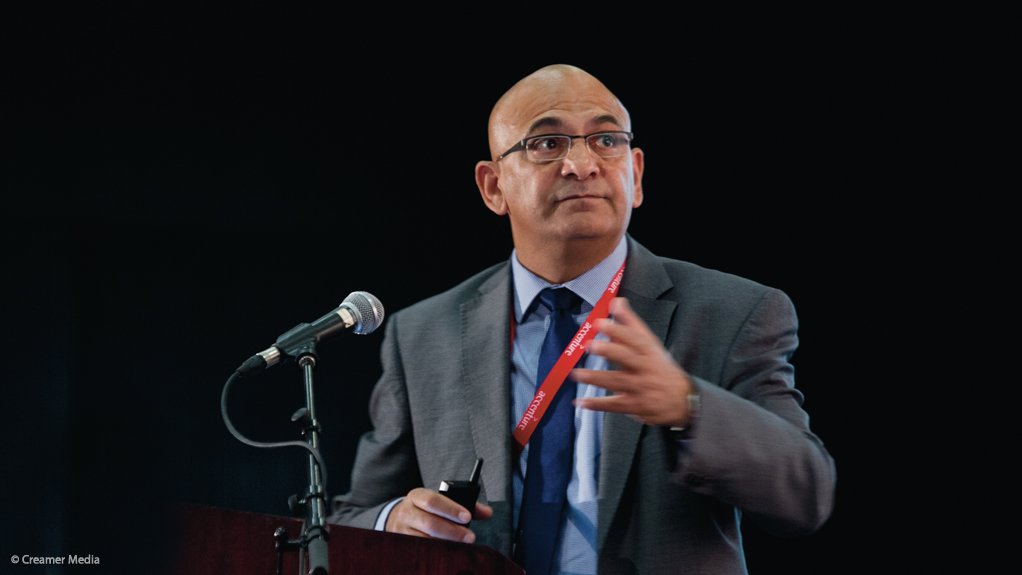Infrastructure goals reliant on finding public, private sector ‘sweet spot’ – Moe Shaik
The achievement of South Africa’s infrastructure development ambitions will depend on finding the so-called “sweet spot” of mutual interest between government, players in the private construction and engineering sectors and financiers, Development Bank of Southern Africa group executive manager for international finance Moe Shaik said on Monday.
“The ‘sweet spot’ of the political economy [from which political will and implementation is driven] is the meeting point of government, private sector and funders. We need to find this point to accelerate our infrastructure goals.
“If we leave infrastructure development to the politicians, we’ll have a world full of white elephants; if we leave it to the engineers, we’ll have a world no one can live in; and if we leave it to the financiers, we’ll have a world no one can afford,” he asserted at the 2014 Infrastructure Africa conference, in Johannesburg.
The former South African Secret Service head further argued that failure to achieve this level of collaboration would result in delays to the implementation of “well-considered” programmes, such as the National Development Plan (NDP).
“This is why Africa is currently not achieving its broad-based growth objectives – the State is the only provider of large-scale infrastructure and it [alone] decides what’s important. There is very little engagement [with the private sector],” he asserted.
Investment holdings firm J&J Group co-founder and former African National Congress coordinator Jayendra Naidoo added that the emergence of so-called “infrastructure activists” was required in the private sector.
“This is a developer that looks at each project and determines how the various problems associated with that project can be solved – not only the construction-related ones.
“For example, he or she must understand the historical land issues [associated with the project], manage the communication strategy surrounding the project, as well as the various relationships related to the project, including those with the community. The business that will succeed [in the infrastructure build sector] will be this activist-type business,” he said.
Naidoo further noted that government would also be required to adjust its approach to infrastructure development, moving away from a trend of “simply announcing the plan” towards an approach through which it was mindful of the interests of the developers, operators, suppliers, regulators and citizenry.
“Infrastructure is often handled in a stop-start way, which results in lengthy delays before attempts to deliver in the run-up to elections.
“If our intention is to maximise job creation [through build programmes], we need a perspective beyond term-based politics, which will require [established] planners in government,” he averred.
Further compounding the delayed implementation of build programmes on the continent, Shaik continued, was the lack of adequate regional cooperation and integration, with some sovereigns indicating that they did not want to “give up power” for the greater good of the region or for any other beneficiary.
“We seem to have a ‘big man syndrome’ in Africa, where political leaders have made huge contributions, [but] consequently [abandon the concept of] joint leadership.
“We like to talk about regional integration, but maybe we don’t really want it,” he suggested.
Addressing this dilemma would require the establishment of efficient regulatory institutions, the facilitation of cross-border financing, the development of political consensus and the establishment of regional infrastructure priorities, said Shaik.
He added that successful infrastructure implementation would rely on the selection of “projects that mattered”.
These would include projects that made a tangible contribution to inclusive growth and job creation and would see skills development and capacity building occurring during the project preparation phase and throughout implementation.
Comments
Press Office
Announcements
What's On
Subscribe to improve your user experience...
Option 1 (equivalent of R125 a month):
Receive a weekly copy of Creamer Media's Engineering News & Mining Weekly magazine
(print copy for those in South Africa and e-magazine for those outside of South Africa)
Receive daily email newsletters
Access to full search results
Access archive of magazine back copies
Access to Projects in Progress
Access to ONE Research Report of your choice in PDF format
Option 2 (equivalent of R375 a month):
All benefits from Option 1
PLUS
Access to Creamer Media's Research Channel Africa for ALL Research Reports, in PDF format, on various industrial and mining sectors
including Electricity; Water; Energy Transition; Hydrogen; Roads, Rail and Ports; Coal; Gold; Platinum; Battery Metals; etc.
Already a subscriber?
Forgotten your password?
Receive weekly copy of Creamer Media's Engineering News & Mining Weekly magazine (print copy for those in South Africa and e-magazine for those outside of South Africa)
➕
Recieve daily email newsletters
➕
Access to full search results
➕
Access archive of magazine back copies
➕
Access to Projects in Progress
➕
Access to ONE Research Report of your choice in PDF format
RESEARCH CHANNEL AFRICA
R4500 (equivalent of R375 a month)
SUBSCRIBEAll benefits from Option 1
➕
Access to Creamer Media's Research Channel Africa for ALL Research Reports on various industrial and mining sectors, in PDF format, including on:
Electricity
➕
Water
➕
Energy Transition
➕
Hydrogen
➕
Roads, Rail and Ports
➕
Coal
➕
Gold
➕
Platinum
➕
Battery Metals
➕
etc.
Receive all benefits from Option 1 or Option 2 delivered to numerous people at your company
➕
Multiple User names and Passwords for simultaneous log-ins
➕
Intranet integration access to all in your organisation



















